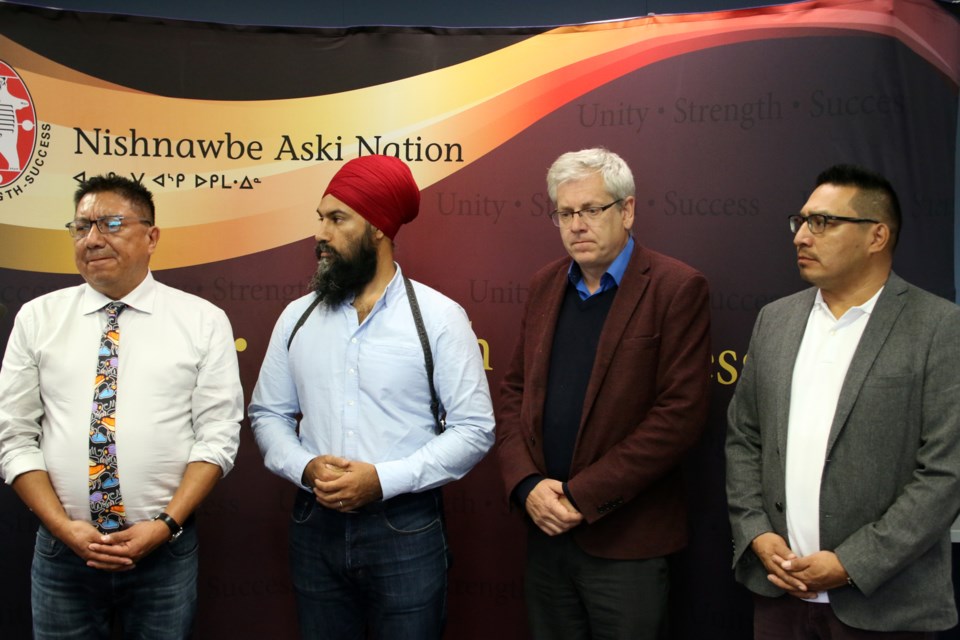THUNDER BAY - Federal NDP leader, Jagmeet Singh, believes that in order to properly address issues affecting First Nations communities, there needs to be a massive restructuring of the relationship between the federal government and Indigenous peoples.
“The basis of any relationship is respect,” Singh said. “The basis for a relationship with the First Nation people has to be that we are respecting sovereign nations as sovereign nations. That is the first vision that we have that we proudly pushed forward this year.”
Singh was in Thunder Bay this weekend and he met with Nishnawbe Aski Nation Grand Chief Alvin Fiddler on Sunday to discuss the issue of education, health care, youth suicide, and treaty rights in NAN territories.
According to Singh, the systems in place now, which are remnants of colonialism, are working just as they were intended to when first instituted.
“If we don’t reform them and reimagine them, they are going to continue to provide the same horrible outcomes, which is inequality, injustice, and we have to change that,” he said.
Making reference to the suicide of a 13-year-old girl in Bearskin Lake First Nation last week, Singh said the federal government is not doing enough to address the underlying social and infrastructure issues that allow tragedies like this to continue.
“The way you solve the systemic problems is with respect, which means funding child care, funding education, funding access to health care,” he said. “When these things are built up and there is a bright future and there is hope, that is when you eradicate some of the despair and the tragedy and trauma that leads to these horrible incidents.”
Fiddler agreed, saying that preventing tragedies requires improving the quality of life for Indigenous youth in remote communities by providing access to quality health care, housing, education, child welfare, clean water, and healthy food.
“We’ve been at this for so long now,” Fiddler said. “The losses continue to happen and families continue to suffer and what we’ve been asking for is more of a plan, a comprehensive strategy on suicide prevention that the federal government can lead.”
Timmins-James Bay MP, Charlie Angus, who was also taking part in the meeting in Thunder Bay, said Canada is the only G7 nation without a national suicide prevention strategy and he intends to bring the debate to parliament this fall.
“It’s about putting targeted investments in the areas we know there are crisis,” he said. “As New Democrats, we will bring this fall to the house Motion 174, calling the government to come to the table to be part of a national suicide action strategy. This is an emergency. We have young people dying.”
“This is not just an Indigenous issue,” Angus continued. “In fact, many Indigenous communities have no higher rates of suicide than other parts of the country. We have to identify what are the causes, where are these horrific hotspots developing, and they are happening all across this country.”
While Singh doesn’t believe the federal government is doing enough to address recommendations as part of the Seven Youth Inquest in Thunder Bay, he did commend a recent funding announcement of $5.6 million for a program designed to help at-risk youth. But more needs to be done than offering one-off funding promises, he said.
“What happens is, and we’ve seen this before, is programs that have limited funding and are working, and then the same organization that has shown they are actually able to show they have an impact on the community, then apply for continued funding and they don’t get it and the program stops,” Singh continued. “One-off funding agreements are a positive step, but it’s not good enough. We need to have stable, sustainable funding.”
“There is a cost to complacency,” Singh said. “If we are complacent, the cost is children lose their lives and lose their future. That is not acceptable.”
When asked if an NDP government would continue funding programs instituted by the Liberal government, Singh said individual programs would need to be evaluated to see if they are serving the needs of the community.
“The solution has often been Ottawa driven, as opposed to grassroots driven,” he said. “With any program, I want to assess the program’s utility based on the communities needs and the community giving that direction and that guidance.”
